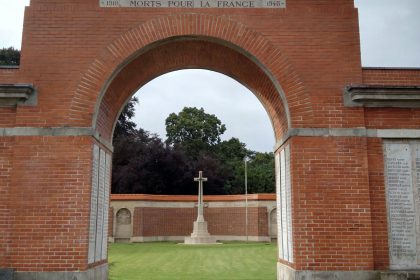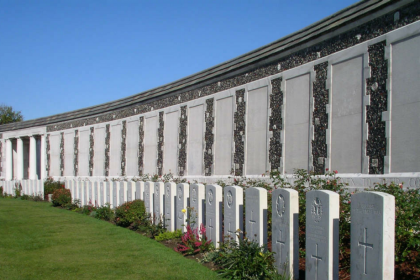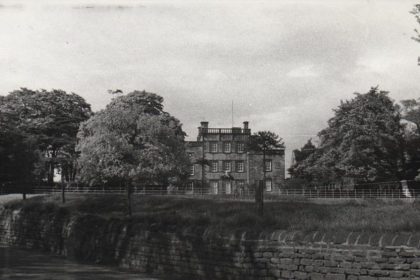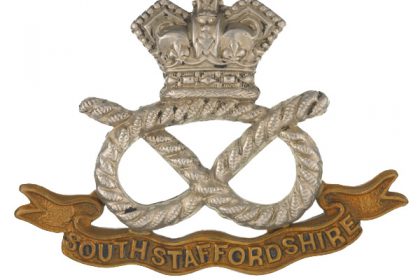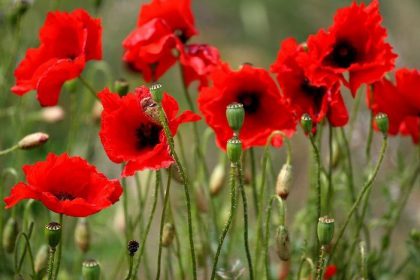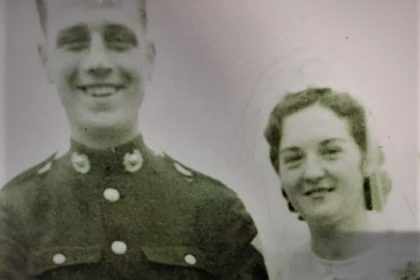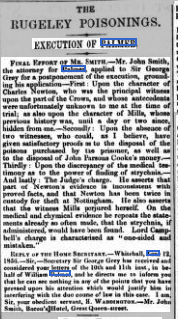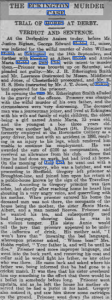 VERDICT AND SENTENCE. At the Derbyshire Assises to-day. before Mr. Justice Bigham. George Edward Hobbs, 21, miner, was indicted for the wilful murder of John William Hobbs at Eckington on the 14th September, and further with shooting Albert Hobbs and Annie Maria Hobbs July 17th. with intent to murder them.—Prisoner was brought up on Saturday, and pleaded not guilty.—Mr. J. H. Etherington Smith and Mr. Lawrence (instructed by Messrs. Middleton and Jones, Chesterfield) prosecuted, and Mr. R. H. S. Hole (instructed Mr. J. T. Jones, of Eckington) appeared for the prisoner.
VERDICT AND SENTENCE. At the Derbyshire Assises to-day. before Mr. Justice Bigham. George Edward Hobbs, 21, miner, was indicted for the wilful murder of John William Hobbs at Eckington on the 14th September, and further with shooting Albert Hobbs and Annie Maria Hobbs July 17th. with intent to murder them.—Prisoner was brought up on Saturday, and pleaded not guilty.—Mr. J. H. Etherington Smith and Mr. Lawrence (instructed by Messrs. Middleton and Jones, Chesterfield) prosecuted, and Mr. R. H. S. Hole (instructed Mr. J. T. Jones, of Eckington) appeared for the prisoner.
In opening the case Mr. Etherington Smith alluded to the gravity of the offence. Prisoner was charged with the wilful murder of his own father, and the circumstances were ‘very distressing’. The deceased man was a journeyman joiner and lived at Eckington with his wife and family of eight children, the eldest being a girl named Annie Maria, 23 years old, and the youngest a boy three years old. There was another lad, Albert (14). Prisoner was formerly employed at the Horncastle Colliery as a pony driver, but met with an accident in 1898, resulting injury to his legs, which rendered him unable to continue his employment. He was awarded the sum of £100 as compensation and received an allowance from his club. Since that time, he had done no work, but had lived at home. On the morning of July 17th, he went out for a walk with a friend named Gregory, who was a butcher, and was proceeding to Sheffield. Gregory left the prisoner at Broughton-lane and joined him upon his return at a public-house known by the sign of the Travellers’ Rest. According to Gregory the prisoner was then sober, but shortly after reaching home he heard him shouting in a very angry voice and quarrelling with his mother. When prisoner entered his home, the deceased man was not there, the occupants of the house being the mother, the sister Maria. Albert, and a man named Reeves. Prisoner said he wanted his tea, and subsequently used bad language, showing that he was in a violent temper. His sister Annie would tell the jury that prisoner appeared to be under the influence of drink. His mother said, “I won’t have that’* (meaning the bad language), whereupon prisoner asked, ” Whose boss?” Mrs. Hobbs replied, “Your father is, and will until he dies.” Prisoner used more improper language, and went into the back yard, and removing his coat and collar said he would fight his father, or any other who was there. He came back and asked where his father was, being informed that had gone to a cricket match. It was then that his sister overheard him say something to the effect that there would be a bullet in somebody before long. Prisoner went upstairs, and has he left the house his mother observed that he had a pistol in his hand. Gregory also noticed it and saw him throw some cartridges on the ground. Prisoner went down the street in the direction of the Bird-in-Hand Inn, and his brother Albert also went round another way to meet 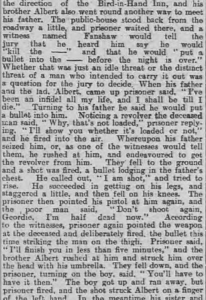 his father.
his father.
The public-house stood back from the roadway a little, and prisoner waited there, and a witness named Fanshaw would tell that he heard him say he would ”kill the —— and that he would “put a bullet into the before the night is over.” Whether that was just idle threat or the distinct threat of man who intended to carry it out was a question for the jury to decide. When his father and the lad, Albert, came up prisoner said, “I’ve been infidel all my life, and I shall be till I die.” Turning to his father he said he would put a bullet into him. Noticing the revolver, the deceased man said, “Why, that’s not loaded,” prisoner replying, “I’ll show you whether it’s loaded or not,” and he fired into the air. Whereupon his father seized him, or, as one of the witnesses would tell them, he rushed him, and endeavoured to get the revolver from him. They fell to the ground and a shot was fired, a bullet lodging in the father’s chest He called out, I am shot,” and tried to rise. He succeeded in getting on his legs, and staggered a little, and then fell on his knees. The prisoner then pointed his pistol at him again, and the poor man said, “Don’t shoot again, Geordie, I’m half dead now.”
According to the witnesses, prisoner again pointed the weapon at the deceased and deliberately fired, the bullet this time striking the man on the thigh. Prisoner said, “I’ll finish you in less than five minutes,” and the brother Albert rushed at him and struck him over the head with his umbrella. They fell down, and the prisoner, turning the boy, said. “You’ll have to have it then.” The boy got up and ran away, but prisoner fired, and the shot struck Albert on a finger of the left hand. In the meantime, his sister and mother, hearing the shots, had arrived on the scene, and Miss Hobbs said. 0h! George do not fire anymore. 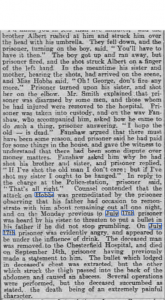 “Prisoner turned upon his sister and shot her on the elbow. Mr. Smith explained that prisoner was disarmed by some men, and those whom he had injured were removed to the hospital. Prisoner was taken into custody, and on the way Fanshaw. who accompanied him, asked how he came to do such a thing? prisoner answering. “I hope the old — is dead. “Fanshaw argued that there must have been some reason, and prisoner said he had paid for some things in the house, and gave the witness to understand that there had been some dispute over money matters. Fanshaw asked him why he had shot his brother and sister, and prisoner replied, “If I’ve shot the old man I don’t care; but if I’ve shot my sister I ought to be hanged.” In reply to the charge at the Police-station, prisoner said, “That’s all right.” Counsel contended that the attack on Hobbs was premeditated the prisoner observing that his father had occasion to remonstrate with him about remaining out all one night, and on the Monday previous to July 17th prisoner was heard by his sister to threaten to put a bullet in his father if he did not stop grumbling.
“Prisoner turned upon his sister and shot her on the elbow. Mr. Smith explained that prisoner was disarmed by some men, and those whom he had injured were removed to the hospital. Prisoner was taken into custody, and on the way Fanshaw. who accompanied him, asked how he came to do such a thing? prisoner answering. “I hope the old — is dead. “Fanshaw argued that there must have been some reason, and prisoner said he had paid for some things in the house, and gave the witness to understand that there had been some dispute over money matters. Fanshaw asked him why he had shot his brother and sister, and prisoner replied, “If I’ve shot the old man I don’t care; but if I’ve shot my sister I ought to be hanged.” In reply to the charge at the Police-station, prisoner said, “That’s all right.” Counsel contended that the attack on Hobbs was premeditated the prisoner observing that his father had occasion to remonstrate with him about remaining out all one night, and on the Monday previous to July 17th prisoner was heard by his sister to threaten to put a bullet in his father if he did not stop grumbling.
On July 17th prisoner was evidently angry and appeared to be under the influence of drink. The deceased man was removed to the Chesterfield Hospital, and died September 14th, prisoner having previously made a statement to him. The bullet which lodged in decease’s chest was extracted, but the other which struck the thigh passed into the back of the abdomen and caused an abscess. Several operations were performed, but the deceased succumbed as stated, the death being of extremely painful character.
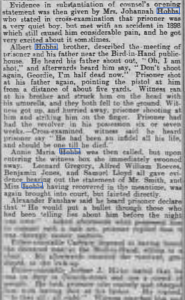 Evidence in substantiation of counsel’s statement was then given by Mrs. Johannah Hobbs, who stated in cross-examination that prisoner was a very quiet boy, but met with an accident in 1898 which still caused him considerable pain, and he got very excited about it sometimes.
Evidence in substantiation of counsel’s statement was then given by Mrs. Johannah Hobbs, who stated in cross-examination that prisoner was a very quiet boy, but met with an accident in 1898 which still caused him considerable pain, and he got very excited about it sometimes.
Albert Hobbs, brother, described the meeting of prisoner and his father near the Bird-in-Hand public house. heard his father shout out. *” Oh, I am shot,” and afterwards heard him say, “Don’t shoot again, Geordie, I’m half dead now.” Prisoner shot his father again, pointing the pistol at him from a distance of about five yards. Witness ran at his brother and struck him on the head with his umbrella, and they both fell to the ground. Witness got up, and hurried away, prisoner shooting at him and striking him on the finger. Prisoner had had the revolver in his possession six or seven weeks. Cross-examined witness said he heard prisoner say He had been infidel all his life and should be one till he died.”
Annie Maria Hobbs was then called, but upon entering the witness box she immediately swooned away. Leonard Gregory, Alfred William Reeves, Benjamin Jones, and Samuel Lloyd all gave evidence bearing out the statement of Mr. Smith, and Miss Hobbs having recovered in the meantime, was again brought into court, but fainted directly. Alexander Fanshaw said he heard prisoner declare that “He would put a bullet through those who had been telling lies about him before the night was over.” Asked afterwards what possessed him to commit such a rash act, prisoner replied that it was through money matters. Police-Constable Carbury deposed having found the deceased man at the 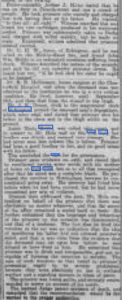 Bird-in-Hand, sitting in a chair. He afterwards received the revolver, produced, at the lock-up. Police-Constable Arthur J. Hicks stated that he was on duty in Church-street and saw a crowd of people. He took prisoner into custody and charged him with having shot at his father. He replied. that all; all right.” Witness searched him and found the two cartridges produced in his waistcoat pocket. Prisoner was subsequently taken to Derby and charged with wilful murder, but he made reply. Examined, witness admitted that prisoner excited. Dr. G. 11. W., Jones, of Eckington, said he was railed to the Bird-in-Hand Inn. and found John Wm. Hobbs in exhausted condition suffering from hock. Witness described the nature of the wounds and said he did not consider prisoner drunk. He heard him “if he had shot his sister he ought to be hanged.” Dr. B. NT. house surgeon at the Chesterfield Hospital. said when the deceased man was admitted to the institution was in very critical condition, lie lived, however, until September 14th, and then died from the wound in the thigh. Mr. J. K. Denny, clerk the magistrates’ Eckington, proved the deceased man’s depositions, which were rend, and stated that prisoner shot his father in the and in the thigh whilst on the ground.
Bird-in-Hand, sitting in a chair. He afterwards received the revolver, produced, at the lock-up. Police-Constable Arthur J. Hicks stated that he was on duty in Church-street and saw a crowd of people. He took prisoner into custody and charged him with having shot at his father. He replied. that all; all right.” Witness searched him and found the two cartridges produced in his waistcoat pocket. Prisoner was subsequently taken to Derby and charged with wilful murder, but he made reply. Examined, witness admitted that prisoner excited. Dr. G. 11. W., Jones, of Eckington, said he was railed to the Bird-in-Hand Inn. and found John Wm. Hobbs in exhausted condition suffering from hock. Witness described the nature of the wounds and said he did not consider prisoner drunk. He heard him “if he had shot his sister he ought to be hanged.” Dr. B. NT. house surgeon at the Chesterfield Hospital. said when the deceased man was admitted to the institution was in very critical condition, lie lived, however, until September 14th, and then died from the wound in the thigh. Mr. J. K. Denny, clerk the magistrates’ Eckington, proved the deceased man’s depositions, which were rend, and stated that prisoner shot his father in the and in the thigh whilst on the ground.
Annie Maria Hobbs was called into court, and in answer to Mr. Hole said on the 17th July her brother was drunk and seemed very strange. She had never seen him behave like it before- Prisoner had been a good brother to her, and on good terms with his father. This concluded the case for the prosecution. Prisoner gave evidence on oath and stated that he recollected having some words with his mother at home on July 17th, but as to all that transpired after that his mind was a complete blank. He purchased the revolver in Nottingham because contemplated going away. His memory had failed him before when he had been excited, but he had never committed any act of violence. Counsel then addressed the jury, Mr. Hole contending on behalf of the prisoner that there was absolutely motive whatever, and that the secret of the affair remained a sealed book to them. He further submitted that the language and behaviour of the prisoner on the occasion was disconnected, and that of a madman. The fact that he fired the revolver in the air was an indication that the idea of murdering his father had not entered prisoner’s mind, and that was clear from the evidence that the deceased man set upon him before was alleged to have fired at him. submitted that prisoner was in a drunk and irresponsible and not incapable of forming the intention to murder. The sale of such weapons as that found in prisoner’s possession ought strictly prohibited, because they were absolutely no use in civilised warfare and standing menace in times of peace. The prisoner was found guilty and strongly recommended mercy on account of his youth. The learned Judge passed sentence of death and remarked that the recommendation would be forwarded to the proper Authorities.

